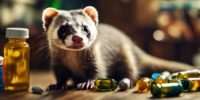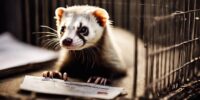How to Tailor Your Ferret's Diet for Optimal Coat Health

Ferrets require a diet high in protein and fat to maintain a healthy coat. Ensure your ferret's diet includes high-quality ferret food that is specifically formulated to meet their nutritional needs. Supplement their diet with small amounts of cooked meat, such as chicken or turkey, to provide additional protein.
It is important to avoid feeding your ferret foods that are high in carbohydrates, as these can lead to obesity and other health issues. Additionally, make sure your ferret has access to fresh water at all times to keep their coat hydrated and healthy.
A balanced diet, rich in protein and fat, along with plenty of fresh water, will help keep your ferret's coat looking shiny and healthy. Regular grooming and brushing will also help distribute natural oils and keep their coat in top condition.
Importance of Proper Nutrition
Proper nutrition plays a crucial role in maintaining the overall health and well-being of ferrets, including the condition of their coats. Nutritional balance is key, as it directly impacts the quality of a ferret's fur. Ensuring that a ferret's diet consists of high-quality protein, essential fatty acids, and vitamins and minerals is fundamental for a healthy coat. In addition to a balanced diet, coat supplements can be beneficial in promoting coat health. Supplements like omega-3 and omega-6 fatty acids can help improve the shine and softness of a ferret's fur.
Hydration is also essential for maintaining a healthy coat. Ferrets should have access to fresh water at all times to prevent dehydration, which can lead to dull and dry fur. Grooming techniques, such as regular brushing, can help distribute natural oils throughout the coat, keeping it moisturized and reducing shedding. By focusing on proper nutrition, hydration tips, and grooming techniques, ferret owners can support the overall health and appearance of their furry companions.
Essential Nutrients for Coat Health

Ferrets require specific nutrients like omega-3 and omega-6 fatty acids, biotin, and zinc to maintain a healthy coat. These nutrients play a crucial role in promoting fur health, shine, and overall condition.
Dietary factors such as protein quality, fat content, and vitamin levels can greatly impact the appearance and texture of a ferret's coat.
Key Nutrients for Coat
Key nutrients such as omega-3 fatty acids and biotin play a crucial role in maintaining a ferret's coat health and appearance. Omega-3 fatty acids help reduce inflammation and promote skin health, leading to a shinier coat. Biotin, a B-vitamin, supports the growth of healthy skin cells and hair follicles, contributing to a lustrous fur coat. Ensuring these nutrients are part of your ferret's diet can significantly enhance their overall coat quality. Below is a table outlining some key nutrients and their benefits for your ferret's coat:
| Nutrient | Benefits |
|---|---|
| Omega-3 fatty acids | Reduce inflammation, promote skin health |
| Biotin | Supports healthy skin cells and hair follicles |
Dietary Factors Affecting Fur
To maintain a ferret's coat health, it's essential to consider the dietary factors that can significantly impact the quality of their fur. Proper nutrition plays a crucial role in ensuring optimal grooming habits and coat quality. Essential fatty acids like omega-3 and omega-6 are vital for a healthy coat, as they help in maintaining skin integrity and promoting a shiny fur appearance.
Additionally, proteins are essential for fur growth and strength. Environmental factors, such as temperature and humidity, can also influence shedding patterns and overall coat condition. By providing a balanced diet rich in these nutrients, ferret owners can help their pets achieve luscious, shiny coats and minimize issues related to fur health.
Protein Requirements for Ferrets
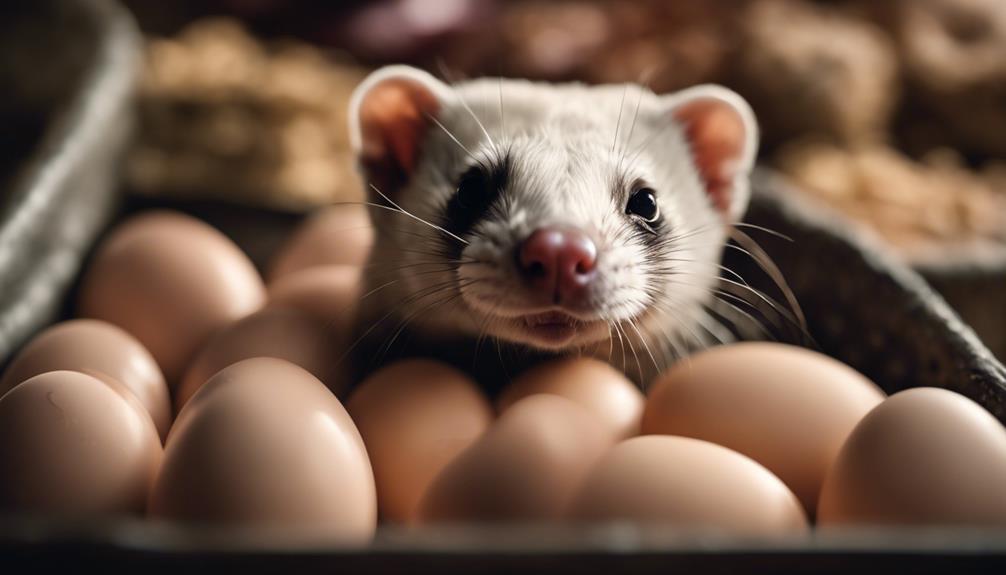
Protein plays a crucial role in maintaining the overall health and well-being of ferrets, supporting their coat health and overall vitality. Ferrets are obligate carnivores, meaning they require a diet rich in high-quality animal-based proteins. When choosing protein sources for your ferret, opt for ingredients such as whole prey, poultry, and meat by-products, as these mirror their natural diet in the wild. Additionally, consider the digestibility factors of the proteins you feed your ferret, as high digestibility ensures optimal nutrient absorption and utilization.
| Protein Source | Digestibility Factor | Benefits |
|---|---|---|
| Whole Prey | High | Mimics natural diet |
| Poultry | Moderate to High | Lean protein source |
| Meat By-Products | Varies | Nutrient-rich alternative |
Proteins from whole prey offer a highly digestible and biologically appropriate option for ferrets, while poultry provides a lean source of protein. Meat by-products can vary in digestibility but offer a nutrient-rich alternative. By selecting protein sources with high digestibility factors, you can better meet your ferret's nutritional needs for optimal coat health and overall well-being.
Healthy Fats and Oils
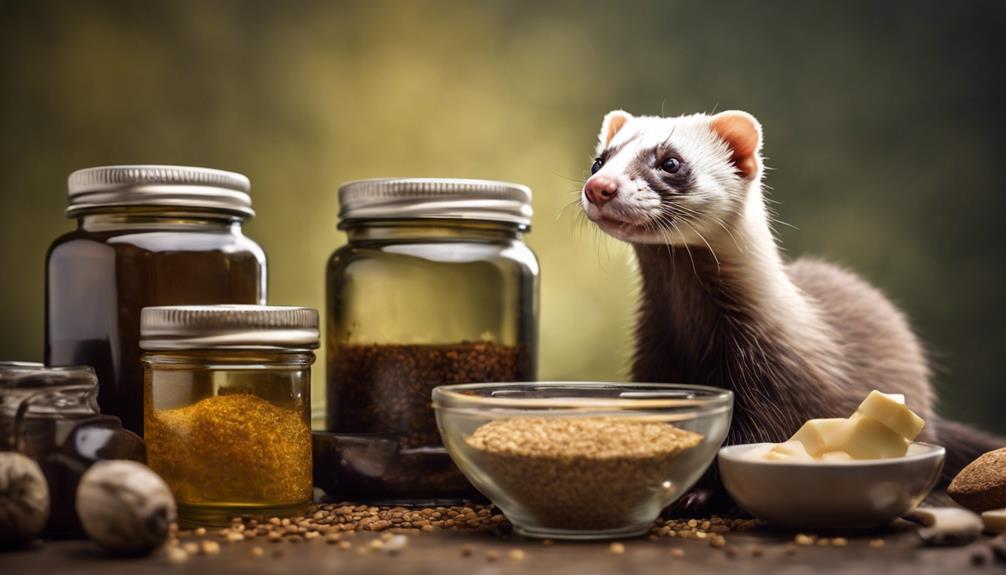
After addressing the protein requirements essential for a ferret's diet, it's crucial to now focus on the significance of incorporating healthy fats and oils to support their coat health and overall well-being.
Omega-3 benefits play a vital role in maintaining a ferret's skin and coat health. These essential fatty acids help reduce inflammation, prevent dry skin, and contribute to a soft, shiny coat. Including sources of Omega-3 such as fish oil or flaxseed oil in their diet can lead to noticeable improvements in their fur quality.
Additionally, coconut oil benefits are worth mentioning when discussing a ferret's diet. Coconut oil is rich in medium-chain fatty acids that can promote a healthy coat by moisturizing the skin, reducing itchiness, and adding a natural luster to their fur. When introduced in moderation, coconut oil can also support a ferret's overall well-being due to its antimicrobial properties, aiding in digestion and boosting their immune system.
Incorporating these healthy fats and oils into your ferret's diet can significantly enhance their coat health and overall quality of life.
Hydration and Its Impact
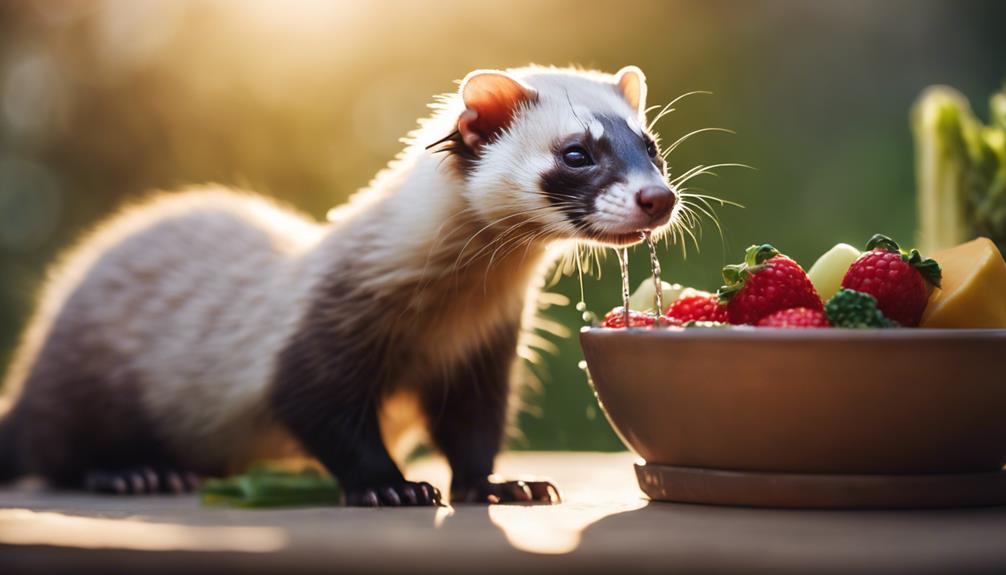
Proper hydration is crucial for maintaining a ferret's overall health, including the condition of their coat. Ferrets should have access to fresh, clean water at all times, with recommended daily water intake varying based on factors like diet and activity level.
Signs of dehydration in ferrets may include lethargy, dry gums, and sunken eyes, emphasizing the importance of monitoring their water consumption closely.
Importance of Hydration
Ensuring your ferret stays well-hydrated is crucial for maintaining its overall health and promoting a glossy, lustrous coat. Adequate water consumption supports essential bodily functions, including ferret grooming, which directly impacts coat hydration and shedding patterns.
Hydration plays a pivotal role in maintaining the skin's elasticity and the coat's natural oils, preventing dryness and brittleness that can lead to dull fur and excessive shedding. By providing your ferret with access to fresh, clean water at all times, you help optimize its coat health and overall well-being.
Water Intake Recommendations
To optimize your ferret's coat health and overall well-being, it's essential to understand the recommended water intake for hydration and its impact on their glossy, lustrous fur. Hydration levels play a crucial role in maintaining a healthy coat, as water is essential for various bodily functions, including skin and coat health.
Ferrets should have access to fresh, clean water at all times to ensure they stay hydrated. Water sources can include a water bottle or a water bowl, but it's important to monitor the water intake of your ferret to prevent dehydration.
Adequate hydration not only benefits the ferret's coat but also supports overall health, making it a key factor in maintaining a shiny and vibrant fur coat.
Signs of Dehydration
Maintaining an adequate level of hydration is crucial for ferrets to prevent dehydration and its potential impact on their overall health, including their coat condition. Dehydration can lead to serious health issues, so it's essential for ferret owners to be able to recognize the signs early on. Here are some key points to keep in mind:
- Recognizing signs: Watch out for symptoms like sunken eyes, lethargy, dry gums, and loss of skin elasticity.
- Prevention: Ensure your ferret always has access to clean, fresh water and adjust their diet to include moisture-rich foods.
- Treatment: If you suspect dehydration, consult a vet immediately for proper diagnosis and treatment.
- Hydration strategies: Consider offering electrolyte solutions or wet food to boost your ferret's hydration levels.
- Regular monitoring: Keep an eye on your ferret's water intake and behavior to catch any signs of dehydration early.
Avoiding Foods Harmful to Coats
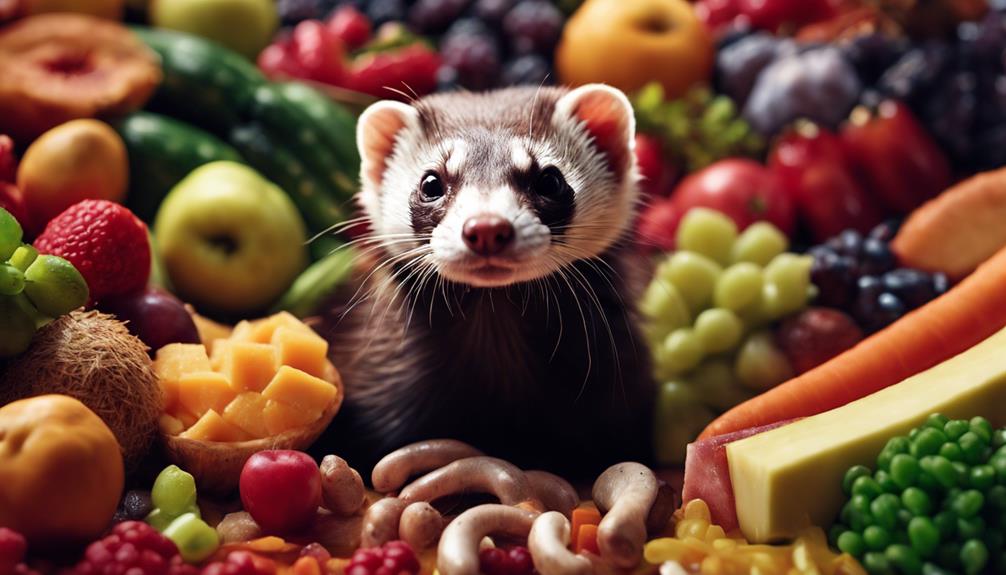
What dietary components can negatively impact a ferret's coat health?
To maintain optimal coat health in ferrets, it's crucial to avoid certain foods that can harm their fur. Foods high in sugar and carbohydrates, such as fruits, vegetables, and grains, can lead to imbalances in a ferret's diet, negatively affecting their coat quality. Additionally, fatty and greasy foods should be limited as they can cause skin issues and dullness in the fur. It's important to steer clear of treats that aren't specifically designed for ferrets, as they may contain harmful additives or ingredients that could impact the coat negatively.
When selecting food for your ferret, opt for coat-friendly treats like freeze-dried meat or high-quality protein snacks. These treats not only provide essential nutrients for a healthy coat but also minimize the risk of adverse reactions. If your ferret experiences shedding issues, consider incorporating shedding solutions like regular grooming, a balanced diet, and access to clean water to support coat health from within.
Supplements for Coat Maintenance
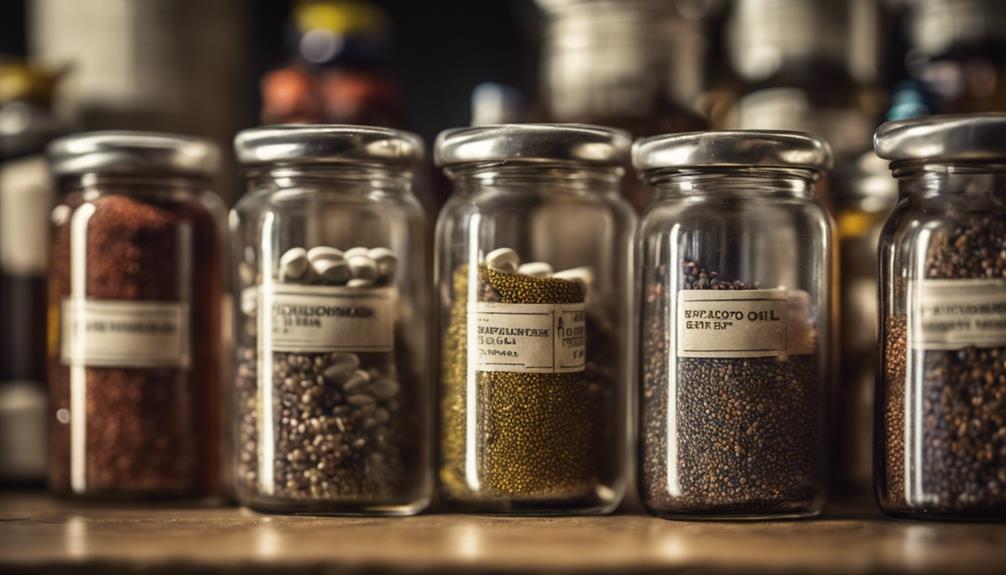
Supplements play a crucial role in enhancing a ferret's coat maintenance regimen by providing targeted nutrients essential for coat health. When considering coat supplements for your furry friend, it's important to ensure you're providing the right dosages to avoid any adverse effects.
Some popular coat supplements for ferrets include:
- Fish Oil: Rich in omega-3 fatty acids, fish oil can help improve coat texture and shine. A recommended dosage is 1/4 to 1/2 teaspoon per day, depending on your ferret's size.
- Biotin: Biotin is known for promoting healthy skin and coat. The suggested dosage for ferrets is 1-2 milligrams per day.
- Vitamin E: Vitamin E is an antioxidant that can aid in maintaining a healthy coat. The recommended dosage is around 5-10 IU per day for ferrets.
- Flaxseed Oil: Another source of omega-3 fatty acids, flaxseed oil can contribute to soft and glossy fur. A suitable dosage is 1/4 teaspoon per day.
- Coat-specific Supplements: There are commercially available supplements tailored for coat health in ferrets that can be beneficial when used as directed.
Frequently Asked Questions
Can the Type of Bedding or Litter Used Affect a Ferret's Coat Health?
Using the right bedding materials is vital for a ferret's coat health. Dusty or harsh bedding can irritate their skin, leading to dull fur. Coat supplements can help improve their fur quality, but bedding choice matters too.
Are There Any Specific Grooming Techniques That Can Improve a Ferret's Coat Health?
Regular grooming with appropriate grooming products can significantly improve a ferret's coat health. During seasonal shedding, gentle brushing helps prevent fur matting. Dietary supplements rich in omega-3 fatty acids can also enhance coat condition.
How Often Should a Ferret's Coat Be Brushed or Groomed to Maintain Optimal Health?
Regular grooming is vital for a ferret's coat health. Brushing should occur at least 1-2 times weekly. Combining this with a proper diet rich in nutrients like omega-3 fatty acids can ensure a shiny and healthy coat.
Are There Any Environmental Factors That Can Impact a Ferret's Coat Health, Such as Temperature or Humidity Levels?
Temperature regulation is crucial for a ferret's coat health. Extreme heat or cold can affect fur quality. Coat supplements like omega-3 fatty acids can help maintain a healthy coat. Ensure a consistent environment for your ferret's well-being.
Can Stress or Anxiety Affect a Ferret's Coat Health, and if So, How Can It Be Managed?
When stress or anxiety plagues a ferret, its coat health may suffer. Stress management through a calming environment and engaging activities can aid. Regular grooming techniques and diet adjustments play pivotal roles in restoring the luster of its coat.



